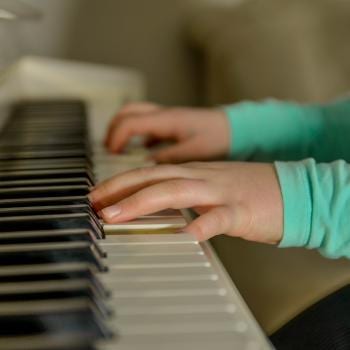One day a few weeks ago, Sally completely lost it. I don’t even remember what it was about, but she just let loose. She was crying and screaming and yelling—and knocking over furniture. Sally knows that being upset is okay, but that hitting people and throwing things or being otherwise destructive is not. It was the evening and Sean was home and I was in the kitchen working on supper with things on the stove, so when Sally began flipping chairs I called Sean in as backup.
Sean picked Sally up and hauled her off upstairs screaming. After a few minutes I could still hear screaming, so I went upstairs to see what was going on. Sean was sitting in an armchair, holding Sally in his arms as she struggled to get free, screaming and writhing. Sean said he had told Sally he would let her go when she had calmed down and was no longer being destructive.
Of course, Sally was screaming that she would calm down when he let her go.
I suppose you could chalk Sally’s refusal to calm down while in her father’s arms up to stubbornness or disobedience, but then, I doubt I would be all that able to calm down while being held against my will myself.
I talked to Sean and convinced him to let Sally go if she promised to go to the bedroom and calm down. Sean and I are okay with this sort of discussion, this sort of suggestion-making between us over parenting, even when it is in the moment like this. I’ve heard people say that parents should not disagree on parenting in front of each other, but I cannot get on board with that. Sean and I respect each other and each other’s parenting, and we are in agreement on all of the basic principles, and we’re aware that kids can play parents against each other and will deal with it as it comes up, so I’m really not that worried. I think it’s healthy for children to know that their parents do not always agree.
When Sean let Sally go, she ran into the bedroom, and I followed and sat by her as she lay on the bed and slowly relaxed. I talked to her as I sat there, telling her again that being upset was okay—that sometimes mommy gets upset too!—but that hitting people or knocking chairs over or throwing things or other destructive behavior was not okay. I told her that her daddy had held her like he did to prevent her from breaking things or hurting people. In the end, we had a very productive conversation about anger and frustration and how to manage it.
Later that evening, I talked to Sean and told him that I didn’t think Sally would have been able to calm down effectively while being held against her will. I suggested that in the future he take her word for it when she said she would calm down if he let her go, and that he only pick her up again if she was again destructive—hitting people or throwing things and so forth. He listened, and we talked about it, and he ultimately agreed. His rationale, after all, was not to punish her but rather to prevent her from being destructive.
I should note Sally is generally a good natured child and is kind, helpful, friendly, and outgoing. She is a favorite at school, and is generally easy to get along with. She adores Sean and I and is constantly writing us notes with hearts. But occasionally—every couple of months, perhaps—she becomes overwrought, and sometimes in those moments she lashes out. She’s only in kindergarten, after all, and is still learning how (and how not) to handle her emotions.
Sally is growing, and her meltdowns are much rarer than they were when she was three and four. She has a full vocabulary and is beginning to gain a feel for her place in the world. When she does have a meltdown, she usually listens when I tell her that it is okay to be angry, but not okay to be destructive. Sometimes I send her into the living room to find some couch pillows to punch, if she thinks that will help. And honestly, this usually works. That day a couple of weeks ago was the only time we have ever constrained her, and I hated it. But in the moment, sometimes we as parents make decisions or embark on courses of action that we later regret.
I believe parenting should be cooperative. I find children are very eager to listen to you if you are willing to listen to them, too. I think children should have some say in coming up with appropriate consequences for misbehavior—beforehand, ideally. You’d be surprised how reasonable and engaged children can be in this process, at least by Sally’s age. At Christmas, Sean’s brother was interested in hearing more about how I parent, and so I told him. I told him about my focus on preparing children to be adults by teaching them adult skills, like how to handle your emotions and the importance of cooperating and finding compromises. Sally was in the room, listening, while doing a headstand in an armchair. “I’m learning things just by listening to you talk about this!” she exclaimed at one point.
And then there’s Bobby. Bobby sometimes has trouble too—he sometimes gets angry with his sister and bites her. He’s two years old and perhaps he ought to know better, but at that age biting is still his best weapon. Sometimes, too, he hits Sally—having an older sister is hard, you see, especially when she tries to show you how to play with your toys when you’d really rather do it yourself. When Bobby bites or hits his sister, we make it clear that this is a very serious thing, and point out how he has hurt Sally, and explain to him that this is not acceptable. We talk to him about being gentle, and about using his words. We teach him to say “No, Sally!” when she is getting in his space, and we teach Sally to respect that.
Very occasionally, Bobby refuses to listen and tries again and again to hit or bite Sally no matter what I say. The first time this happened, I was at a loss. What to do! Move him to a room by himself? I settled on picking him up and holding him on my lap and telling him I would put him down when he agreed not to hit or bite his sister. He was upset, and didn’t want to be on my lap, and tried to get off, but I told him I could not let him hurt his sister. Finally he stopped being angry and when I asked, he said he would not hit his sister, and so I put him down, and he was fine. I’ve had to do this exactly twice, ever, but I suspect this is where Sean got the idea.
Sean and I try not to parent punitively. For us, this means more than just not spanking our children. We focus on making every experience educational, and helping our children learn to behave appropriately through modeling and through giving positive feedback. I believe children respond better to this than they do to punishment. We don’t use time-outs, and we only hold the children as described here if they are being destructive—i.e. if they are hitting or biting or throwing things or knocking things over—and even then we talk to them first, and that is usually enough.
And we are not perfect. Sometimes I snap at my children, and then take a deep breath and apologize. But apologize I do—I think it’s important for children to know their parents aren’t perfect. I would argue that it’s also important for children to hear their parents apologize, and to know that their parents, too, are in process and trying to do better.
When I write about parenting, my pieces are usually upbeat and happy. I’m sharing some new connection I’ve made with my children, or something I’ve learned or realized. Today I simply want to point out that not every day is a good day. There are days when the children are yelling at each other and can’t seem to play nicely, and days when I’m trying to finish a project and they’re continually asking me for things, like I’m a dispenser of some sort. There are days when neither one of them wants to get dressed for school, and days when I sit in the car and wonder if I have the energy to take unbuckle them and bring them inside.
And there are days when everything seems to be going wrong and I look at my children and where I’ve gone wrong, or how we’re ever going to make it out the other side of parenting in one piece.
It’s a lot easier to talk about the good times than it is to talk about the hard times. You see this on facebook, too, as mothers (and it usually is mothers) are quick to talk about the good times, and to gush over their children, so that there’s a sort of happy-happy glean over their facebook lives and you wonder what there is underneath. And so I want to say that yes, we have our bad days too, sometimes, and the days when I wish getting the children out of the library and into the car while holding an armload of books felt less like herding cats.
This thing we call parenting is hard.














